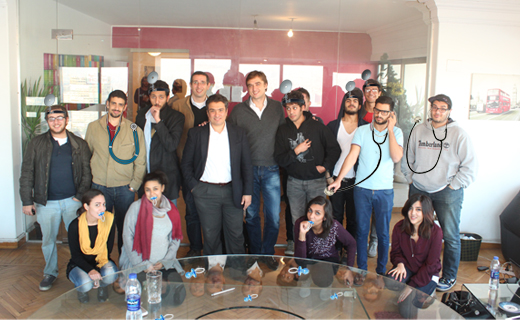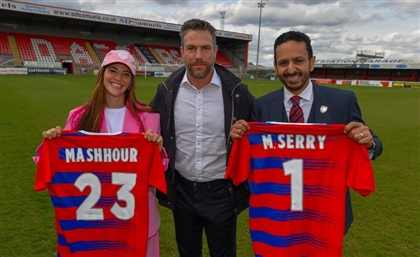Tabibi Calling
A doctor, an entrepreneur and a logistics expert walk into a room… no, it’s not the beginning of a joke. It’s the beginning of a revolutionary new medical experience in Egypt…

Launched in March of 2011, Tabibi 24/7 was the first medical concept of its kind in Egypt and a rarity amongst the medical community worldwide. A truly modern paediatric service born of the digital age, the company offers round-the-clock medical care, private house calls and two state-of-the art clinics all just a click (or phone call) away. We invited founders Kareem Ragab (Managing Director), Khalil Abdel Khalek (Medical Director) and Waleed Abdel Hadi (Operations Director) into the CairoScene offices to talk crazy mums, sexy TV doctors and, saving lives…
So Tabibi is this really interesting concept that blends medicine and tech and logistics… What type of industry would you consider yourselves to be in?
Waleed: That’s a question we’re regularly asking ourselves and it’s not an easy one to answer. There isn’t anything out there quite like Tabibi. We developed the concept ourselves and we’re building it as we go along. If anything we’d categorise it as a company that provides a professional service to its clients, backed up by a strong IT infrastructure and a strong operations infrastructure.
You all come from very different backgrounds – How did you all get together and how did the idea come about?
Khalil: Between the three of us we have eight kids, so naturally there’s an interest in good paediatric care. I was Kareem kids’ doctor and one day after finishing up a house call at his house, we started talking. He had just left Citadel Capital and was looking for a business opportunity and asked if I had any ideas. I immediately responded that I had this is idea of a group of medical practitioners going to homes and clinics and using IT in medicine. He seemed very interested so I told him go download a series called Royal Pains and if he liked the idea to give me a call in the morning. The next day he calls me and says, “Yalla, we’re in, we’re starting, I have an apartment, were going to move.” And then Waleed joined us and to start off there was just the three of us in the office.
How long did it take for this idea to turn into a functioning website?
Khalil: Just over three months.
Kareem: If you are a patient of Tabibi you can actually access the backend of this website, and you have your full electronic medical records, and anyone who is a client has a full medical history for their children. So when their vaccinations are due, they get automatic reminders.
How many registered patients does Tabibi currently have?
We’ve served about 3000 patients and out of them, 500 to 800 who are regular patients, for whom Tabibi is the main doctor. They lean on us for the medical care of their kids.
And how did you get the word out about this service? There must have been an initial reluctance to trust this “new way” of doing medicine, especially when it comes to kids…
Kareem: We were lucky to have Khalil on board. Khalil is a third generation paediatrician, so he was our Trojan Horse, so to speak. But like any doctor or any human being, he cannot work 24/7, so there were times when people would call and Khalil was not there, so that was an opportunity to let other doctors into the network. We have two tiers of doctors, seniors and juniors. Depending on the case, we start introducing patients to the other doctors, and with time, they realise it’s about the team, it’s about the service not the individuals. But it is not an easily marketable product - word of mouth and doing a great job is the core of everything. From my own experience, many doctors don’t spend enough time playing or bonding with the children. Our clinics are very nice, full of toys and games. We try to have a relationship with the mother and the child, and not just treat a disease.

How many doctors are on the team now?
Khalil: We have five seniors and six juniors.
How did you screen these doctors, and in screening these doctors, how did you ensure they have those great bedside manners you’re talking about…
Khalil: I work at Cairo University, and I’m involved in training young doctors so I get to see all medical grads specialising in paediatrics, and I’m kind of interviewing them as I go along. A lot of them have the knowledge but they didn’t have the right way of dealing with their patients, so we created the Tabibi specifically to teach them how to be with the children and how to talk to the parents, how to comfort them. With the senior doctors, we chose people that have our way of doing things.
And what’s the biggest challenge you face when training new doctors?
Khalil: They’re much better trained for the serious stuff, so when it’s a mild situation, they tend to feel that it’s not an issue, they can’t always understand why the parents are so concerned. We try and make them understand that for parents, everything is a big concern.
Parents are always paranoid about their kids, so before you make a house call, how can you tell if it’s something serious or just a crazy overdramatic mum?
Khalil: You can’t really tell and you can’t really depend on that because every single month we get an event when we’re going to get a call and possibly think, “Ahhh, it’s just another feverish baby and nothing is wrong, if it was an experienced mother she wouldn’t be that worried,” and, oops, it’s an explosion. In paediatrics even the gravest conditions start in the same simple way. So, paranoid parents should remain paranoid!
Kareem: We have a training programme for our call centre agents, and one of the things they have to learn is to differentiate between red flag and yellow flag cases. Red flag is a case where we recommend that the mother takes the child to the hospital right away and we meet at the hospital because it’s that critical. Yellow flag is something we have to go to right away, and it includes a number of medical conditions, but it also includes a very worried mother, so if we see the mother is very worried, this is a reason for us to be there right away.

Can you tell us about a yellow flag situation that was completely exaggerated?
Khalil: I would never say it’s an over-exaggeration, that’s the thing. To me, any concerned parent needs someone to reassure them. A big part of what we would do as physicians is reassuring you that there is nothing wrong.
Kareem: We actually love the crazy overdramatic parents! The question is, do we focus on the patient or do we focus on the disease? We like to have a relationship with the mother, we like the mother to turn to us, and from what I’ve seen, with time, we find a way to work things out after the seventh or tenth visit.
So how is the work load divided up between home visits and clinic visits? Can you get a home visit if you want, at any time?
Kareem: A home visit is more expensive – between 350LE and 450LE and a clinic visit is 200LE. So there is an economic aspect to it. If you want to pay for home visits all the time, you can have that, but it’s a little bit more of a luxury product than the clinic visit.
So would you say you’re an A-Class product?
Kareem: At the moment yes.
Intentionally or just because of the price point?
Kareem: We looked at it in the way that mobiles were launched. Originally they were a very premium product until all the operations were in place, until everyone understood how things worked and how to build more efficient systems and infrastructures. We’ve starting just skimming the market, but our vision is to provide a broad product. We don’t want it only to be an A-class product.

It seems the company is growing steadily, are you in a position to scale? What measures have you got in place?
Khalil: More doctors, more locations, more centralised hubs so that we can serve different areas.
Kareem: We’re currently have clinics in Maadi and Sheikh Zayed, and this year we have plans to add the 5th Settlement, Zamalek or Mohandessin, and Downtown to our physical locations. We want to also integrate a practice that belongs to Khalil’s family into the Tabibi family. That’s the easy part; the challenging part is to attract paitents and develop and to get the doctors ready. To a very large extent, what we do is HR. HR and systems development are the two things that we always have to do to be able to grow and expand.
Does your clinic have all the equipment you need, or is there still equipment that you’re looking to acquire to make sure that you can cover everything?
Khalil: We have all the equipment that we need but we’re always looking for more new and sophisticated equipment to help with the whole experience. Of course most of the equipment you need is in your head. We have a new machine to measure jaundice in babies, which can be quite dangerous when they’re first born. We use it instead of using a blood sample right away, it’s a good screening tool. We measure the oxygen content in babies with a non-invasive thing that clips to your finger, and that denotes if they have a healthy heart or not. For kids with respiratory problems, we have a mist inhalation machine that helps them breath better.
And all of this you can take on your house visits?
Kareem: Yes. We have a pretty sophisticated back-pack. Big but not too big, some of the female doctors complain, though! But they’re really quite comprehensive, not only in terms of the equipment that’s in there, also in terms of the right vaccines, the right prescriptions, with the invoices already written so it’s as efficient as possible to provide the service.
How would you rate the level of paediatric care in Egypt as a whole?
Khalil: Let’s say that there are two things in medicine in general - there are doctors and there are medical facilities or medical services. There are a lot of good doctors that don’t have access to good medical facilities to work in or appropriately managed medical facilities to work in. So we’re not creating new doctors, we’re not giving doctors knowledge they didn’t already get, we’re just making the service a better place or the whole experience a better way, so instead of you coming to the clinic and waiting for two hours to see a doctor, you have an allocated time you will be seen in, you have a full medical secretary that will help the doctor and help the patient get their service.
Do you offer online medical help?
Kareem: Parents can call us and we help them on the phone. We’re thinking about developing an additional concept where people can call and talk to a doctor and ask certain questions. You can do that as long as you don’t prescribe medicine over the phone, but you can provide general advice.
Are there any fees associated with registering?
Kareem: At the moment it’s a pay-per-visit system, but we’re also working on a system where we develop a Tabibi loyalty card where you pay us a small fee, and you become part of the system and get a number of services for free. Right now we’re spreading the love and providing a variety of services for free that cost us money, so that more people get to know us. I think in the future, when we have a big enough customer base, we might have some sort of membership system.
Are you planning to expand beyond paediatrics?
Kareem: We are offering additional services as needed, so we already have a paediatric surgeon, we have a homeopath, we have a family medicine doctor, and we have a psychologist, and they are services that are provided on demand. But our core is paediatrics.
That’s really interesting, do you provide mental care at home?
Khalil: We don’t provide it at home; we provide it in our clinics.
Khalil, would you consider yourself a doctor or an entrepreneur?
Khalil: A doctorpreneur maybe.
When your kids are sick and the doctor comes, is it a Tabibi doctor and do you pay them?
Kareem: Yes it’s a Tabibi doctor and yes I pay them.
You do?!?
Kareem: Yes because otherwise, I don’t pay and then my relatives don’t pay, it gets to be too much...
Khalil: He gets it back in the end.
Kareem: Having said that, our employees do not pay.
Have you had any outside investment into Tabibi?
Khalil: Yes, recently. We had investors with us for the aim of growth.
Speaking of growing, what’s your ultimate objective?
Kareem: In Egypt, we want to be everywhere, or everywhere where it’s feasible. Our current view is that this is about 40-50 clinics or areas.
Khalil: With expansion, we will be able to decrease the price and provide the same level of care.
Who are your favourite TV doctors?
Kareem: I don’t watch TV doctors, but Khalil is an avid fan of Grey’s Anatomy.
Khalil: We tell doctors not to act like House, not to fall in love like in Grey’s Anatomy, and not to be extra funny like in Scrubs.
You do know your TV doctors!
Khalil: My daughter actually loves these shows and we watch them together. The problem is these TV doctors give the general population unrealistic expectations about what medicine can or can’t do. So you get a bullet in your brain and expect that McDreamy wala McSteamy can save your life.
We’re just imagining The Tabibi Show where there’s a mother who’s worried, her daughter has a cold and she doesn’t really have a cold and that’s the end of the show.
Hahahaha.
Craziest mother story ever?
Kareem: Well, lots of mothers want to have Khalil, and he obviously cannot be there all the time.
Khalil Are you like the McDreamy of Tabibi?
Khalil: McSteamy.
Check out Tabibi at www.Tabibi247.com or on Facebook and Twitter
- Previous Article I Got Banged!
- Next Article Nomades Land























